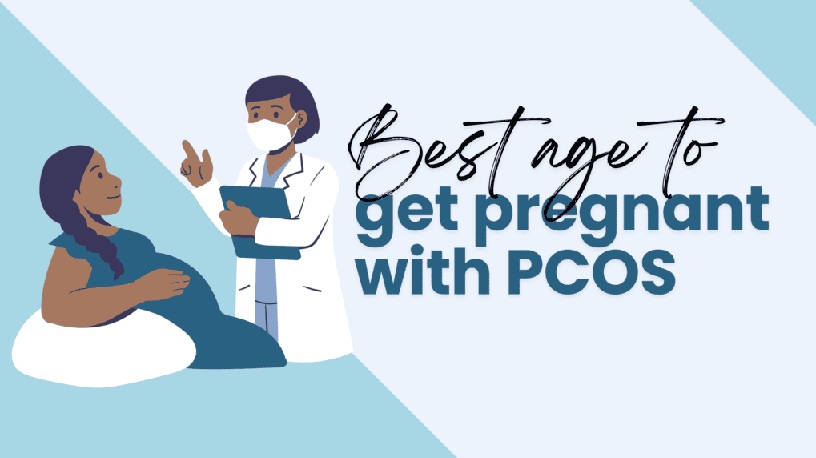Polycystic ovary syndrome (PCOS) is a common hormonal disorder that affects women of reproductive age, and it can significantly impact fertility. One of the most important considerations for women with PCOS who want to become mothers is determining the Best Age to Get Pregnant with PCOS. This article will explore the best age for pregnancy with PCOS, the likelihood of having a boy or a girl, the chances of getting pregnant naturally with PCOS, and strategies to conceive quickly.
Table of Contents
Understanding PCOS

Polycystic ovary syndrome is a condition where a woman’s hormones are out of balance. It can lead to irregular menstrual cycles, excess androgen (male hormones), and cysts on the ovaries. These hormonal imbalances can interfere with the ovaries’ ability to release eggs, which is essential for conception. Women with PCOS may also face challenges with insulin resistance, obesity, and metabolic issues that can complicate the ability to get pregnant.
Symptoms of PCOS
Some common symptoms of PCOS include:
- Irregular periods: Women with PCOS often experience irregular or absent menstrual cycles.
- Excessive hair growth: Higher levels of androgen can lead to unwanted facial or body hair.
- Acne and oily skin: Hormonal imbalances often lead to skin problems.
- Infertility: The inability to ovulate regularly can result in difficulty getting pregnant.
- Weight gain: Many women with PCOS struggle with weight management due to insulin resistance.
Understanding PCOS and how it affects fertility is crucial for women who are trying to get pregnant.
Best Age to Get Pregnant with PCOS

The best age to get pregnant with PCOS largely depends on individual health factors, including hormone levels, weight, and how well the condition is managed. Generally, women are most fertile in their 20s and early 30s. However, women with PCOS may face challenges even in their 20s, so it is important to understand the key factors affecting fertility in PCOS.
Age and Fertility with PCOS
In their early 20s, women with PCOS may still have relatively regular ovulation, but as they enter their late 20s and early 30s, fertility can begin to decline. The rate of ovulation tends to decrease with age, and women with PCOS may experience more difficulty as they approach 35. The chances of conception naturally decline after this age, even with PCOS, due to reduced egg quality and quantity.
- Before 30: Fertility can still be good, but lifestyle factors such as weight management, diet, and exercise will significantly impact the chances of pregnancy.
- 30 to 35: This is still a reasonable window for pregnancy with PCOS, but women may need more assistance in regulating ovulation, such as medications or assisted reproductive technologies (ART).
- After 35: Fertility decreases further, and women with PCOS may require treatments like clomiphene citrate, metformin, or IVF to conceive.
It is often recommended for women with PCOS who are trying to conceive to seek fertility treatment earlier than those without the condition, particularly if they are over the age of 35.
PCOS and the Likelihood of Having a Boy or Girl

One common question that many women with PCOS may have is whether the condition affects the chances of having a boy or a girl. While many factors determine the sex of the baby, such as genetic factors from both parents, PCOS itself does not directly influence whether a woman will conceive a boy or a girl.
However, there are certain factors indirectly related to PCOS that might influence the likelihood of having a boy or girl:
- Hormonal Imbalances: Women with PCOS tend to have higher levels of testosterone and other androgens. Some believe that this may slightly increase the chance of having a boy, though there is no definitive scientific evidence to confirm this.
- Ovulation and Timing: Since women with PCOS often struggle with irregular ovulation, determining the precise timing of conception may influence the chances of having a boy or girl. According to some theories, timing intercourse closer to ovulation is believed to increase the chances of having a boy.
Despite these theories, the determination of a baby’s sex is largely due to chance and is not strongly influenced by PCOS itself.
Chances of Getting Pregnant with PCOS Naturally
Women with PCOS can still get pregnant naturally, but their chances may be lower than women without the condition due to the irregular ovulation patterns that often accompany PCOS. According to studies, around 70% of women with PCOS can conceive with the right lifestyle adjustments and medical interventions.
Factors Affecting Natural Conception with PCOS
Several factors can influence the ability to get pregnant naturally with PCOS:
- Ovulation Disorders: Women with PCOS often do not ovulate regularly, making it difficult to predict when they are most fertile. This can lower the chances of conception.
- Insulin Resistance: Many women with PCOS have insulin resistance, which can impact fertility. Managing blood sugar levels can improve fertility chances.
- Weight and Lifestyle: Women with PCOS who maintain a healthy weight and manage stress levels may have a better chance of conceiving naturally. Regular exercise and a balanced diet are crucial in managing PCOS and improving fertility.
How to Get Pregnant with PCOS Quickly Naturally

While women with PCOS may face challenges when trying to conceive, there are several strategies they can use to increase their chances of getting pregnant naturally and quickly.
1. Track Ovulation
Since women with PCOS have irregular cycles, tracking ovulation can be extremely helpful. This can be done by:
- Using ovulation predictor kits: These kits measure hormone levels to determine when ovulation is about to occur.
- Monitoring cervical mucus: Changes in cervical mucus can indicate ovulation.
- Basal body temperature charting: A rise in body temperature may indicate that ovulation has occurred.
2. Maintain a Healthy Weight
Excess weight can worsen PCOS symptoms and impact fertility. Losing just 5-10% of body weight can significantly improve ovulation and increase the chances of pregnancy.
- Diet: A diet rich in whole foods, including fruits, vegetables, lean proteins, and healthy fats, can support hormone balance.
- Exercise: Regular physical activity can help manage weight, improve insulin sensitivity, and regulate menstrual cycles.
3. Manage Insulin Resistance
Many women with PCOS have insulin resistance, which can hinder ovulation. Taking steps to manage insulin levels can improve fertility.
- Metformin: This medication is often prescribed to help manage insulin resistance and improve ovulation in women with PCOS.
- Low Glycemic Index Diet: Eating foods that do not spike insulin levels can help with hormone regulation.
4. Consider Supplements
Some supplements may improve fertility in women with PCOS, including:
- Inositol: Studies suggest that inositol, particularly myo-inositol, can help restore ovulation and improve egg quality.
- Vitamin D: Deficiency in vitamin D is common in women with PCOS and can affect fertility.
- Omega-3 Fatty Acids: These may improve hormone balance and reduce inflammation.
5. Seek Medical Advice Early
If you are not ovulating regularly or have been trying to conceive for over a year (or six months if you’re over 35), it’s a good idea to seek help from a fertility specialist. Medications like clomiphene citrate, letrozole, or gonadotropins can help stimulate ovulation.
6. Reduce Stress
Chronic stress can negatively impact hormonal balance and fertility. Practicing mindfulness, yoga, or other relaxation techniques can help reduce stress and improve your chances of conception.
Finally To Sum Up
The best age to get pregnant with PCOS is ideally in the late 20s to early 30s, as fertility naturally declines after age 35. While PCOS can present challenges for conception, many women with the condition can get pregnant naturally, especially with lifestyle changes, medical intervention, and careful tracking of ovulation. The chances of having a boy or girl are not directly influenced by PCOS, but the condition does affect fertility and may require additional treatment to conceive. By making smart choices regarding weight management, insulin resistance, and ovulation tracking, women with PCOS can increase their chances of conceiving quickly and naturally.







